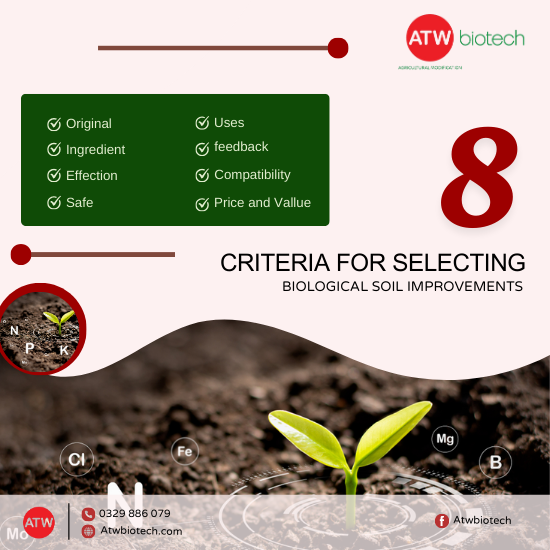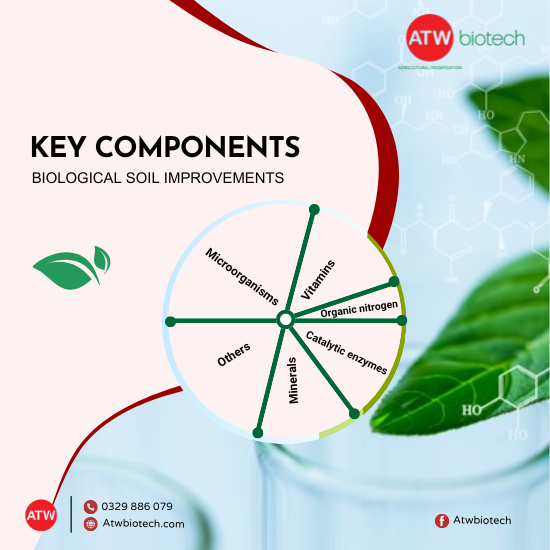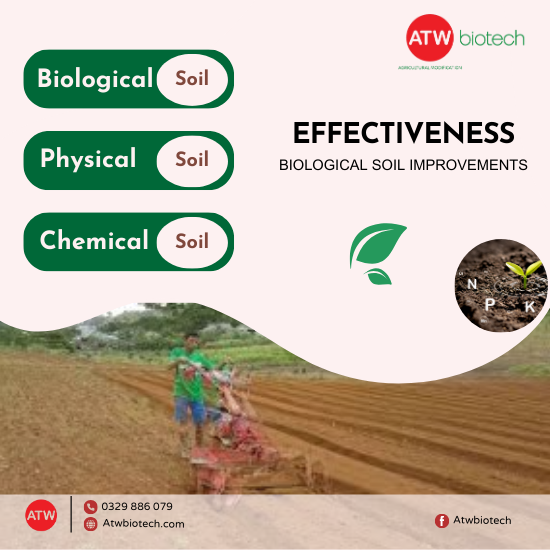When choosing biological products for soil improvement, farmers need to consider several important criteria to ensure effectiveness and safety for crops. Here are eight key criteria to guide your decision-making.

Criteria for Selecting Biological Soil Improvements
Choose biological products with clear origins, produced by reputable companies. This ensures the product has undergone quality control and is safe for the environment. Ideal products include biofertilizers, particularly those based on beneficial microorganisms. For authentic products, contact companies directly, such as ATW Biotech at hotline: 032 988 6079.
Examine the active ingredients in the product. Beneficial microorganisms (fungi, bacteria) and natural enzymes can improve soil structure and enhance nutrient and water retention. Key components include:
 Key Components of Biological Soil Improvements
Key Components of Biological Soil Improvements
Select products proven to enhance soil fertility, improve structure, and boost plant growth. Effective improvement should:
Biological soil improvements should contain live microorganisms that can break down organic and inorganic compounds in the soil. This process enhances soil structure, making it more crumbly and well-aerated, which is crucial for healthy root development and water infiltration.
Soil improvements need to provide a comprehensive range of nutrients and minerals essential for crop growth. By diversifying the nutrient profile in the soil, these improvements help prevent nutrient imbalances and soil degradation, promoting a healthier growing environment for plants.
Biological soil improvements should include strains that suppress harmful microorganisms while stimulating the growth of beneficial ones, such as earthworms. This interaction increases the diversity of soil microorganisms and enriches the nutrient supply for crops, ultimately contributing to better soil health and increased agricultural productivity.
 3 Effectiveness of Biological Soil Improvements
3 Effectiveness of Biological Soil Improvements
Ensure the product is safe for users, crops, and the environment. Avoid products containing harmful chemicals such as nitrates (NO₃⁻), phosphates (PO₄³⁻), arsenic (As), or paraquat.
Check the product’s compatibility with the crops you are cultivating. Some improvements work well with certain crops but may not be effective with others. Look for versatile products that are compatible with a variety of crops.
The product should come with clear, easy-to-understand instructions. This helps farmers apply it correctly for optimal results. Consider contacting the company for specific usage recommendations based on your soil conditions.
Seek feedback from users of the product. Reviews from fellow farmers and experts can help you choose the right product. Engage in community discussions, join groups, and check online reviews for more information.
Finally, weigh the product's cost against its benefits. Select products that are not only effective but also economically viable. While biological products may have higher upfront costs compared to chemical alternatives, their long-term sustainability and benefits are often greater.
ATW Biotech, a part of the AQ Group, has over 14 years of experience and innovation in agricultural biotechnology. Their product, ATW ReSoil, has undergone rigorous testing and is widely used by farmers, with over 500 successful applications and counting. With a focus on safety, quality, and cost-effectiveness, ATW Biotech aims to support farmers in sustainable agricultural practices.
Improving acidic soil can be manageable with a long-term strategy. Choosing the right biological soil improvements is crucial for crop yield and health. By considering the criteria outlined above, you can make informed decisions for your farming needs. Don’t hesitate to seek expert advice to maximize agricultural productivity.
We hope this information helps you find effective ways to improve acidic soil, enriching it for better crop yields and successful harvests!